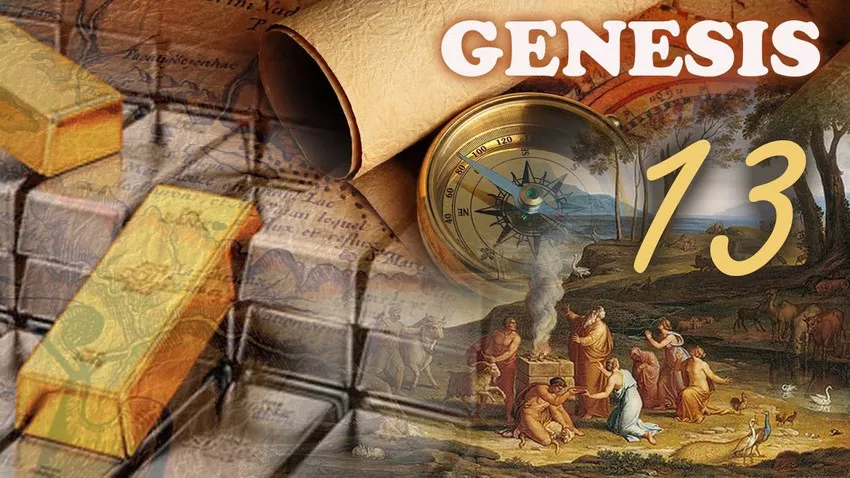Genesis Chapter 13 Summary
Genesis Chapter 13 recounts the separation of Abram (later Abraham) and his nephew Lot due to increasing conflict between their herdsmen over limited resources. After returning from Egypt, Abram and Lot realize their growing wealth and flocks make it impossible to share the same land peacefully. Abram, acting selflessly, offers Lot the first choice of land. Lot selects the fertile plains near Sodom, while Abram settles in Canaan. Following the separation, God reaffirms His promise to Abram, assuring him that his descendants will inherit the land and become as numerous as the dust of the earth.
Bible Genesis Chapter 13
Welcome to read Genesis Chapter 13. Here is the list of Genesis Chapter 13:
What Does Genesis Chapter 13 Teach Us?
The chapter not only highlights themes of conflict and resolution but also teaches us about faith, generosity, and God’s continued guidance.
The Importance of Generosity and Humility (Genesis 13:1-9)
Genesis 13 begins with Abram and Lot returning from Egypt to the land of Canaan, where both had become very wealthy, possessing flocks, herds, and tents (Genesis 13:2). However, the land could not support both of their large households, leading to quarrels between their herdsmen (Genesis 13:6-7).
Faced with the growing conflict, Abram demonstrated humility and generosity by offering Lot the first choice of land, saying, “Let there be no strife, I pray thee, between me and thee…for we be brethren. Is not the whole land before thee? Separate thyself, I pray thee, from me: if thou wilt take the left hand, then I will go to the right; or if thou depart to the right hand, then I will go to the left” (Genesis 13:8-9, KJV).
Abram’s approach teaches us a valuable lesson in humility and peacemaking. Rather than asserting his authority as the elder or trying to claim the best land for himself, he allowed Lot to choose. His willingness to avoid conflict, even at personal cost, reflects the biblical principle that seeking peace and the well-being of others is more valuable than pursuing personal gain. This example encourages us to prioritize relationships and peace over material wealth.
The Consequences of Selfish Choices (Genesis 13:10-13)
When Lot was given the opportunity to choose where to settle, he chose the fertile plains of Jordan, which included the cities of Sodom and Gomorrah (Genesis 13:10-11). Lot’s choice was based on the apparent prosperity of the land, which “was well watered everywhere…even as the garden of the Lord” (Genesis 13:10, KJV). However, this decision would prove to have severe consequences.
While the land seemed appealing, the Bible notes that “the men of Sodom were wicked and sinners before the Lord exceedingly” (Genesis 13:13). Lot’s choice, driven by material considerations, led him to settle near a city known for its moral corruption, eventually drawing him into the dangers associated with Sodom.
This teaches us a crucial lesson about decision-making: not all that glitters is gold. Lot’s choice serves as a warning to consider not only the material benefits of our decisions but also the spiritual and moral environment we are entering. Sometimes, what appears prosperous on the outside may hide significant spiritual danger.
God’s Continued Blessing on Abram (Genesis 13:14-18)
After Lot’s departure, God reaffirms His promise to Abram. He instructs Abram to look in every direction and promises that all the land he sees will belong to his descendants forever. God tells Abram, “I will make thy seed as the dust of the earth: so that if a man can number the dust of the earth, then shall thy seed also be numbered” (Genesis 13:16, KJV).
This moment underscores that while Abram gave up the best land, God was faithful to provide even more than what was lost. God’s covenant with Abram was not dependent on material wealth but on Abram’s faith and obedience. The land Abram now stood on would belong to him and his descendants forever—a clear sign that God’s blessing is not limited by human circumstances.
For modern believers, this section teaches the importance of trusting in God’s promises. When we act with integrity and generosity, even if it seems we are losing out in the short term, God will bless and provide for us in His perfect way and timing.
Genesis chapter 13 offers a wealth of lessons for today’s readers. Abram’s humility and generosity in the face of conflict are powerful examples of how to prioritize peace and relationships over material wealth. Lot’s choice of the seemingly prosperous land near Sodom serves as a warning that appearances can be deceiving and that decisions should be made with spiritual and moral consequences in mind.
Above all, this chapter emphasizes God’s faithfulness. Despite Abram’s willingness to take the lesser land, God reaffirmed His covenant with him, promising a lasting inheritance. Genesis 13 teaches us to trust in God’s promises and to live with faith, integrity, and humility, knowing that God’s provision is far greater than anything the world can offer.


